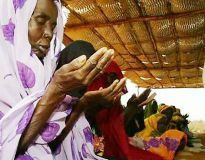Sudan’s Darfur peace talks reopen as Africa boosts peacekeepers
ABUJA, Oct 21 (AFP) — Sudanese rebels and government envoys restarted their stalled peace conference after the African Union confirmed it would multiply its truce-monitoring force in the region seven-fold.
 AU mediators welcomed both sides back to the Nigerian capital after a month-long pause, calling on them to move quickly to agree on a way to give hope to the civilian victims of Darfur’s mounting humanitarian crisis.
AU mediators welcomed both sides back to the Nigerian capital after a month-long pause, calling on them to move quickly to agree on a way to give hope to the civilian victims of Darfur’s mounting humanitarian crisis.
“The refugees and displaced persons of Darfur are looking to Abuja for peace, and the whole world is also looking at us,” AU special envoy Hamid Algabid said at the conference’s brief opening ceremony.
Formal talks will not begin until Monday, Algabid said, but delegates will meet on Friday and over the weekend in seminars and workshops. The whole conference is expected to last three weeks, but may be extended.
The talks, designed to bring an end to a bloody 20-month-old civil conflict, began on August 23 but broke down almost a month ago amid wrangling over their scope. AU diplomats have since been in talks with both parties.
“The consultations we have made during the period of adjournment have made us optimistic about the present talks,” Algabid said.
The first item on the warring parties’ agenda will be a humanitarian protocol which they agreed last month during the first round of talks but failed to sign or put into effect, he explained.
The protocol was drawn up to guarantee the protection of the 1.5 million people whom the United Nations estimates have been driven from their homes during the conflict, and safeguard access to observers and aid workers.
“We’re prepared to talk peace and achieve peace because this is crucial to solving the humanitarian crisis in Darfur,” said Ahmed Tugod, chief negotiator for the rebel Justice and Equality Movement (JEM).
“But it all depends on the government side. They have to show their commitment to restore peace in Darfur,” he warned. The JEM was joined at the talks by its allies in the Sudan Liberation Movement (SLM).
The head of the Sudanese delegation, Agriculture Minister Majzoub al-Khalifa, said: “The humanitarian protocol is very important and we expect that it will be signed in the next few days.”
Fighting erupted in Darfur when the rebels launched an armed insurrection in protest at what they see as the political and economic marginalisation of the region’s black African people by the Arab-led government in Khartoum.
The government responded by unleashing the Janjaweed, a proxy militia of mounted Arab gunmen.
In the ensuing slaughter, according to UN estimates, some 70,000 people have been killed and 1.5 million driven from their homes to a life of hunger and harassment by the Janjaweed in refugee camps.
The United Nations has described the suffering of Darfur’s civilians as the “world’s worst humanitarian disaster” and the United States has accused Khartoum of sponsoring a genocide.
The UN Security Council has threatened to impose sanctions on Sudan’s oil industry if peace talks fail.
Against this backdrop, the African Union has been labouring to prove that the continent can resolve its own crises.
The body summoned the warring parties to peace talks in Abuja on August 23 only to see them break down one month later after the two sides failed to agree on the scope of the negotiations.
Simultaneously, the AU pressured Sudan into accepting the deployment of an African armed force to monitor a shaky ceasefire signed in April and oversee the implementation of whatever agreements are eventually reached in Abuja.
The lead Rwandan and Nigerian elements of the AU force have already arrived in Darfur, and at a meeting in Addis Ababa on Wednesday AU envoys endorsed plans for a massive expansion of the force, from 465 to 3,320 personnel.
The troops will be provided by Nigeria, Rwanda, Tanzania and Gabon according to AU sources in Addis Ababa, where the pan-African body has its headquarters.
